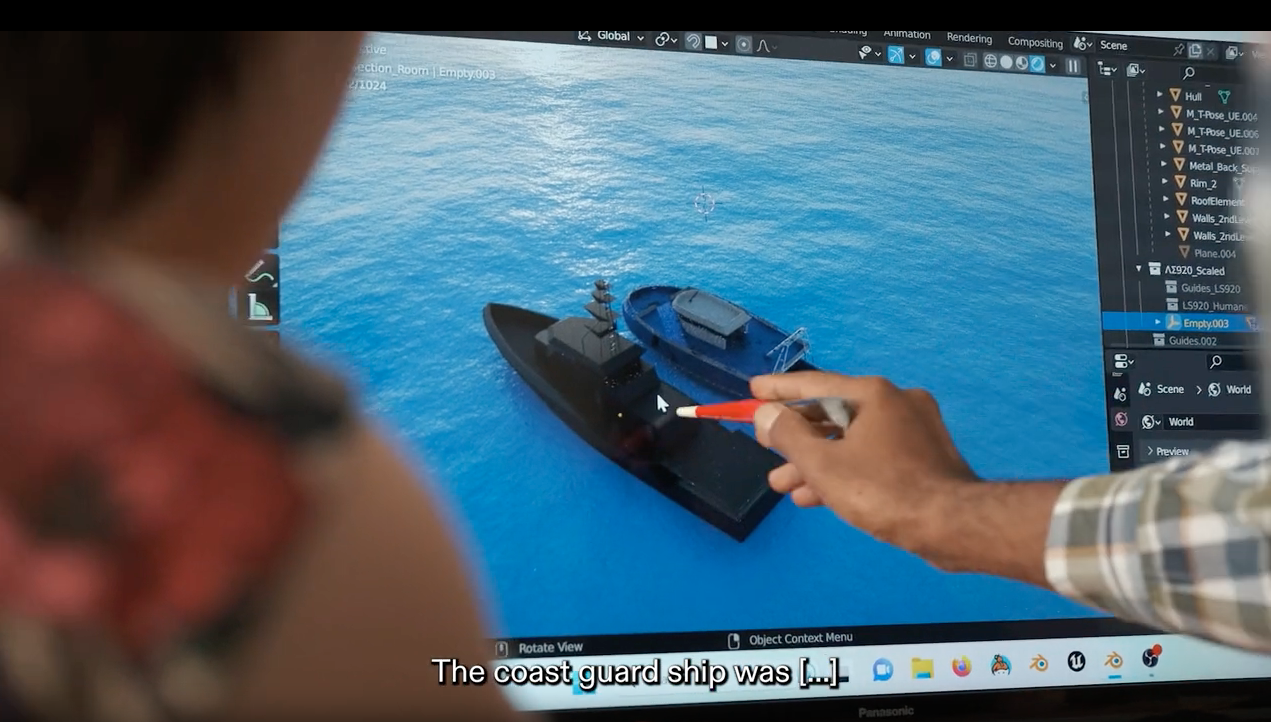This is an update to our previous statement on the Pylos case, which can be found here.

Screenshot taken from the Forensis investigation into the shipwreck near Pylos.
One month after the shipwreck took place near Pylos, in the night of 13 to 14 June 2023, relatives of the victims continue to feel alone and abandoned. They say that they are not receiving sufficient support from the Greek authorities in their search for loved ones.
A relative told Alarm Phone that even seven days after the submission of the DNA reports to Greek authorities, the authorities have still not provided any information concerning the identification procedures or their duration. After more than a week of waiting, the Pakistani embassy in Greece finally submitted a list of names of the identified persons amongst the dead.
So even if relatives did all the possible steps of identifying a missing person, the Greek authorities fail to support them in the identification process. For families missing relatives, every day of uncertainty counts! At least they need clear information about procedures and the possible steps to take.
There is also no information regarding the many missing who drowned at sea and will most probably never be recovered. The Hellenic Coastguard (HCG) has stopped searching for them. When bodies remain absent, families remain in uncertainty and are often unable to mourn their loss. Hundreds of families are now in the same desperate situation, hoping for information that will most probably never come.
In the meantime, the reconstruction of the deadly shipwreck near Pylos, published on 7 July by Forensis, together with Solomon, The Guardian, STRG_F/ARD and with contributions by Alarm Phone and the Geek Council for Refugees, «reveals inconsistencies» in the account spread by the Greek authorities. The investigation further outlines the inconsistencies that Alarm Phone had already formulated on the day of the shipwreck. It also highlights the cynicism of the dehumanizing narrative that the Greek authorities are spreading, that blames the people on the move for their own death.
- Reconstruction by Forensis: https://counter-investigations.org/investigation/the-pylos-shipwreck/
- Investigation by Solomon: https://wearesolomon.com/mag/format/investigation/under-the-unwatchful-eye-of-the-authorities-deactivated-cameras-dying-in-the-darkest-depths-of-the-mediterranean/
- Video by STRG_F/ARD: https://www.youtube.com/watch?v=x_yLcgm_Dks
- Guardian investigation: https://www.theguardian.com/global-development/2023/jul/10/greek-shipwreck-hi-tech-investigation-suggests-coastguard-responsible-for-sinking
When joined together, the many pieces of evidence and survivor testimonies show that over 600 people died because of the actions and inactions by the Hellenic Coast Guard on 13 and 14 June 2023.
It is undisputed that the incident occurred within the Greek Search and Rescue (SAR) zone. However, disputed is what occurred right before the boat started sinking, with no other vessel except the HCG sea patrol ΠΠΛΣ 920 at the scene of distress. Before that, the HCG had ordered several commercial vessels that provided assistance to leave the scene and HCG ignored repeated offers by Frontex to support. In addition, several cameras and the AIS tracking of the HCG vessel were deactivated during the night. After that, HCG started to spread inaccurate and conflicting information, regarding location and speed of the boat in distress, trying to cover up their responsibility to rescue. Instead, they blame the travellers themselves and have begun to criminalise nine of the survivors.
The testimonies of 26 survivors, the detailed reconstruction by Forensis and partners, and further evidence of the HCG’s crucial role in the murder of over 600 people make it clear: we should carefully listen to the ones affected by brutal border violence and we have to continue to shed light on the deadly (in-)actions by state actors such as the Hellenic Coast Guard.
We will never end our struggle against these crimes. Or as one of the survivors, who lost many of his loved ones, put it: «I need to find them some justice». Collective efforts to unveil what happened, and a collective struggle to fight against the circumstances which led to this massacre, can be small but important steps in this direction.